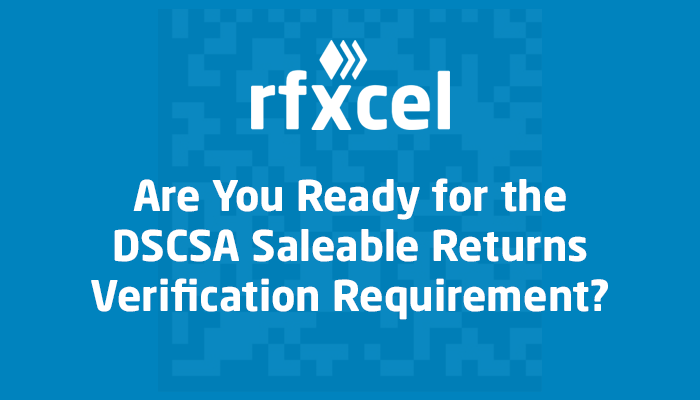Note about DSCSA saleable returns: On October 23, 2020, the FDA delayed enforcement of the DSCSA for dispensers and wholesale distributors. Read the details here.
The Drug Supply Chain Security Act (DSCSA) is transforming every aspect of the U.S. pharmaceutical supply chain. The law has many parts, but today we’re focusing on the DSCSA saleable returns verification requirement, one of its key mandates. Let’s jump right in.
First, what is the DSCSA?
The DSCSA went into effect on November 27, 2013. It is actually Title II of the Drug Quality and Security Act (DQSA) and calls for product tracing, product identifiers (PIs), authorized trading partners, and verification requirements for manufacturers, wholesale distributors, repackagers, and dispensers (pharmacies).
The goal of the DSCSA is to facilitate product tracing in the pharmaceutical supply chain and, ultimately, promote patient and consumer safety and ensure the authenticity of products. Non-compliance is “prohibited … and subject to enforcement action under the [Federal Food, Drug, and Cosmetic Act].” In a nutshell, if you’re out of compliance, you’re out of business.
What is the DSCSA saleable returns verification requirement?
Millions of pharmaceutical products are returned for resale every year in the United States. These are known as “saleable returns.” Under the DSCSA saleable returns verification requirement, wholesalers must verify saleable returns before they can be reintroduced to the supply chain. In other words, every returned drug has to be vetted — declared as safe and legitimate — before it can be sold again. This is accomplished by verifying the drug’s PI, which has four components: a Global Trade Item Number (GTIN), a unique serial number, a lot ID, and an expiration date.
The DSCSA saleable returns verification requirement for distributors was originally scheduled to take effect on November 27, 2019; however, as we discussed in a previous blog post, the FDA in late September 2019 announced that it did “not intend to take action against” wholesalers that did not meet the requirement before November 27, 2020. This 1-year postponement gave pharma supply chain stakeholders more time to prepare to comply.
Of course, November 27, 2020, is only a few months away. Are you going to be ready? More on that below.
How does the DSCSA saleable returns requirement work?
The easiest way to understand the DSCSA saleable returns requirement is to think of the U.S. pharma supply chain as having only two members: wholesalers and manufacturers. And the law requires them to talk with one another about returned drugs. Here’s what we mean.
To meet the DSCSA saleable returns verification requirement, a wholesaler must initiate a verification request (to a manufacturer) to verify the returned products before it can resell them. The manufacturer that receives that request must provide a verification response within 24 hours. This is why wholesalers are called requestors and manufacturers are called responders.
The 24-hour deadline, however, doesn’t meet business realities. Why? Because, as we mentioned above, millions and millions of drugs are returned every year. The volume is just too great. Therefore, wholesalers need manufacturers to provide verification responses almost instantaneously — at the sub-second level, not in a few minutes, let alone an entire day.
Enter the Verification Router Service (VRS).
The VRS and the DSCSA saleable returns verification requirement
VRS is a huge topic, and to get into the details is outside the scope of what we’re talking about today. Put simply, the VRS enables the rapid, secure exchange of data between requestors and responders to meet the DSCSA saleable returns verification requirement.
The Healthcare Distribution Alliance (HDA) is the driving force behind the VRS, which facilitates the “talk” between wholesalers (requestors) and manufacturers (responders) to verify every drug. Here, a third member joins the DSCSA saleable returns “family”: A solution provider that enables the verification requests to be routed between wholesalers and manufacturers.
The VRS is an automated service that verifies if a PI is valid. There are multiple VRS providers, and each is responsible for determining if a specific group of PIs is valid. A wholesaler can call any VRS provider to verify if a PI is valid. If a provider does not manage that particular PI, it will automatically route the verification request to the appropriate provider. All of this happens in real time, and the VRS ensures that information is accurate and up to date.
Final thoughts
rfxcel is the industry thought leader in the DSCSA saleable returns verification requirement and the VRS. Not only did we extend testing of VRS, we implemented a VRS pilot program for the Food and Drug Administration. We’re applying our expertise in supply chain track and trace, serialization, and compliance solutions to help the pharma industry prepare for November.
And we can help you too. Contact us today to talk with one of our supply chain experts and see how our award-winning rfxcel Traceability System can ensure you comply with the DSCSA saleable returns verification requirement — and meet all your other supply chain needs.
CONTACT US TO SEE THE VRS SOLUTION AND FDA TEST RESULTS:





